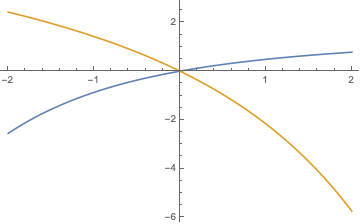Is there a closed-form expression for this series?
$\displaystyle\sum_{k\geq 1}^\infty \frac{\lambda^k e^{-\lambda}}{k!}\cdot[1-(1-x)^k]\cdot \frac{1}{k}$
Any answers, ideas or references would be appreciated.
No closed form expression in terms of elementary functions, but if you are satisfied with special functions (incomplete Gamma function $\Gamma$ and exponential integral Ei), then $$\displaystyle\sum_{k=1}^\infty \frac{\lambda^k e^{-\lambda}}{k!}\cdot[1-(1-x)^k]\cdot \frac{1}{k}=$$ $$=e^{-\lambda}\,\Re \bigg(\text{Ei}\left(\lambda\right)+\ln (x-1)+\Gamma \left[0,\lambda (x-1)\right]\biggr),\;\;\lambda,x\in\mathbb{R}.$$ ($\Re$ indicates the real part.) Here is a plot of the $x$-dependence for $\lambda=+1$ (blue) and $\lambda=-1$ (gold).
